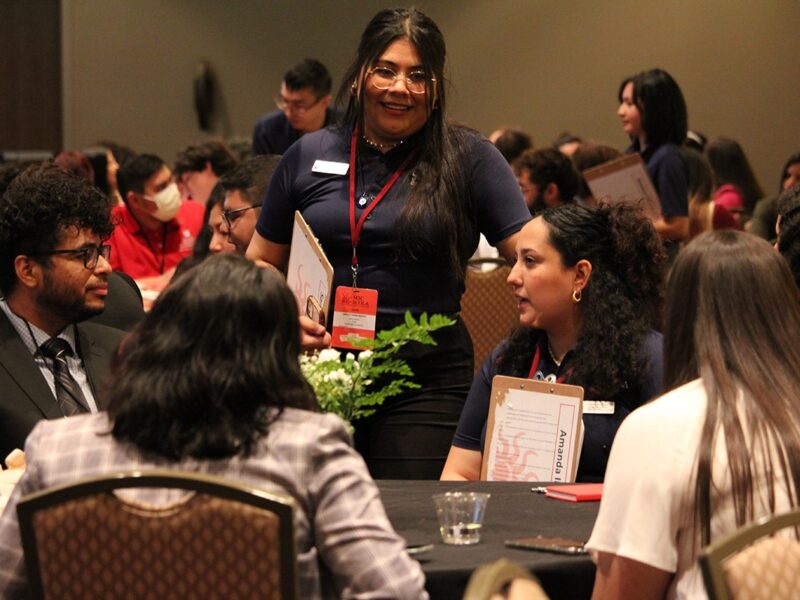Virtual Symposium Promotes Quality Language Programs For International TAs

The English Language Proficiency program (CTE-ELP) within Texas A&M University’s Center for Teaching Excellence (CTE) hosted a first-of-its-kind virtual symposium for professionals who provide English instruction to teaching assistants who speak English as a Second Language (ESL). Representatives from seven universities across Texas attended the half-day event via Zoom recently.
Teaching assistants (TAs) play a much-needed pedagogical role in large universities that conduct high levels of research, said Ginessa Payne, an English language proficiency Ccnsultant in the CTE. She said without TAs, undergraduate students would have far fewer opportunities to get their questions answered, do hands-on laboratory experiments, participate in facilitated group discussions and receive thoughtful feedback on assignments.
Brandon Cooper, also an English language proficiency consultant, added, “These TAs are students themselves, juggling their own graduate courseload and research while teaching, often for the first time.”
A certain group of TAs has to juggle extra challenges on top of all these: language differences and an unfamiliarity with American educational culture: international TAs (ITAs). They often have acquired English overseas in school, using textbooks that did not include “howdy.” Many ITAs who have gone through the CTE-ELP program, report that while undergraduates outside the U.S., they studied in teacher-centered classrooms in which professors did almost all the talking during class, and students rarely asked questions, CTE officials said.
Libby Smith, an international studies major and student worker at the CTE, has studied under international instructors, like many other Aggies. “When your TA is an international student who also has a language barrier, it can sometimes present some struggles when you have questions or concerns about the class,” she said. “However, because they learned the topic in a different environment, they can be really helpful and explain things in a different way that can help you understand a concept in a new light.”
Recognizing that the effectiveness of the TA affects the success of their undergraduate students, the CTE provides professional development for TAs, both domestic and international. For non-native speakers of American English, there is year-round linguistic support in the form of workshops, private consultations, conversation partnerships, a language lab and more. This ELP program is funded by a portion of the international student fee, plus a generous donation by the Galloway Foundation.
Xueyan Hu, a Ph.D. candidate in the Department of Teaching, Learning, and Culture, already had teaching experience in her native China before coming to Texas A&M, but said she expanded her repertoire of teaching and speaking strategies to better connect with her Aggie students.
“I like ELP programs in that it extends our English language learning experience by connecting language learning with cross-cultural communication,” she said. “Through their various programs, not only did I learn how to deliver my lecture in English effectively, I also learned how to adapt my style of teaching and communication to American undergraduates.”
Hu now assists the CTE by sharing advice with novice ITAs, assessing the effectiveness of the ELP program, and conducting research on the comprehensibility of ITAs’ speech.
Texas law (Sec. 51.917) requires instructors in higher education to have proficiency in spoken English. Therefore, several universities across the state have programs with the same goal: training ITAs to be comprehensible and confident. However, universities achieve this goal using various testing instruments, modes of instruction and program structure, CTE officials said.
The ELP consultants at Texas A&M, Payne and Cooper, saw the value of gathering with their counterparts to increase their understanding of each other’s programs, share best practices and prepare for the future (especially the shift to remote testing and instruction during the COVID-19 pandemic). They spearheaded an event that originally was to be held in Austin at the University of Texas, but then was converted to the Zoom videoconferencing platform, hosted by Texas A&M. Co-organizers were Christine McCourt and Crystal Kusey of U.T. Austin and Xueyan Hu of Texas A&M.
The group, which has dubbed itself “TexITAP” (Texas International Teaching Assistant Professionals) has already held a follow-up meeting and scheduled yet another.
“The TexITAP symposium provided an enriching opportunity to connect with colleagues across Texas that are serving non-native speakers of English as they teach, the students whom they are teaching and their home departments,” said Linley Melhem, director of the ITA program at Texas Tech in Lubbock, one of the longest-standing ITA programs in the nation. “I was inspired to learn of the various creative strategies employed to empower teaching candidates to communicate effectively. This meeting was especially timely as we collectively face new challenges in evaluating and training teaching candidates at a distance. I look forward to the ongoing collaboration that will surely be born from this inaugural symposium.”
One highlight of the event, organizers said, was the presentation by Lucy Pickering (Texas A&M-Commerce), an authority on ESL pronunciation and ITAs’ speech. Her talk on intonation patterns honed the attendees’ ability to notice differences in pronunciation that may lead to misunderstanding, something they can apply when coaching ITAs.
“We’re applied linguists, so it’s especially satisfying to put knowledge of linguistics to work, to solve real-world communication problems,” Payne said. “But the ones who deserve the credit are the international TAs themselves. It takes a lot of work to adjust the way you speak, and it takes a lot of courage to stand in front of a class and lead it using a language that isn’t your primary one.”
Media contact: Lesley Henton, lshenton@tamu.edu





